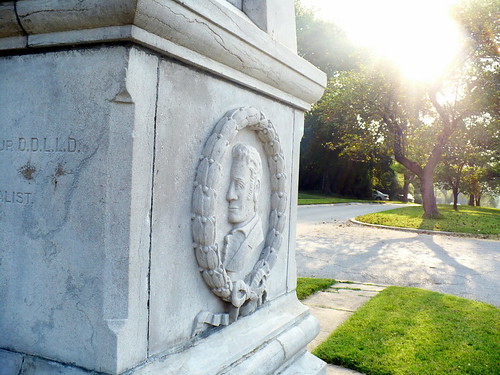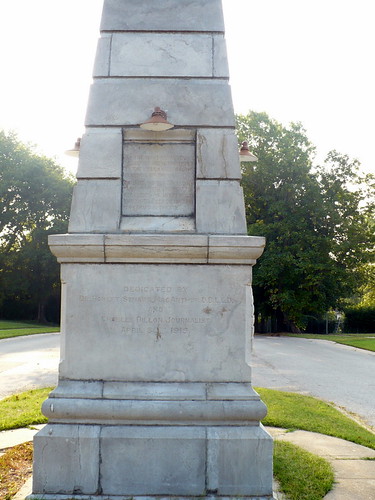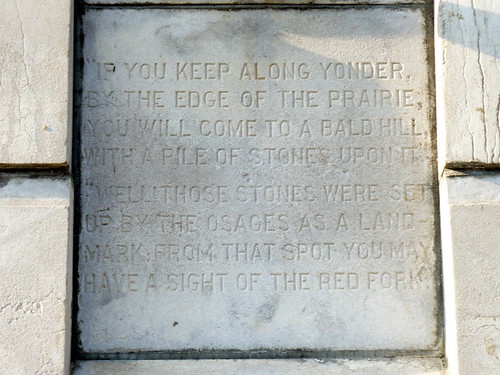“We came upon the banks of the Arkansas [River], at a place (near Tulsa) where tracks of numerous horses, all entering the water, showed where a party of Osage hunters had recently crossed the river on their way to the buffalo range . . . ." "A little farther on, we reached a straggling Osage village, on the banks of the Arkansas. Our arrival created quite a sensation. A number of old men came forward and shook hands with us severally; while the women and children huddled together in groups, staring at us wildly...." The scene in the painting portrays the parties' camp the evening of the encounter at the Osage village. "...several Osage Indians, visitors from the village were mingled among our men." "We gave them food, and, what they relished, coffee; for the Indians partake in the universal fondness for this beverage, which pervades the West." - A Tour of the Prairies, Washington Irving, 1835. Link
The Washington Irving Monument, located in north Tulsa, was dedicated on May 1915.
“This monument was erected and donated to the public by Mr. and Mrs. Gabriel Norman Wright to commemorate the visit of the great author to this locality on October 14, 1832, in company with a party of U. S. Rangers from Cantonment Gibson. They camped that night about thirteen miles west of this point, near the present town of Wekiwa.” LinkA Tour on the Prairies
In "A Tour on the Prairies," Irving takes us with him on his exploration of Pawnee country, into regions that had not yet traversed by white men. Irving's narrative is a romanticized retelling of his adventures into these unexplored Western lands, which is now part of Oklahoma. As he writes in the beginning, "Who can tell, when he sets forth to wander, whither he may be driven by the uncertain currents of existence; or when he may return; or whether it may ever be his lot to revisit the scenes of his childhood!"
Irving says, "There is something exciting to the imagination and stirring to the feelings, while traversing these hostile plains, in seeing a horseman prowling along the horizon." The weather was perfect; the game was plentiful; and the "glorious country" spread out "far and wide in the golden sunshine." His descriptions of the dangers of the hunt are remarkable, though the thrill of the chase often overwhelmed any fear of danger or death.
In his quixotic quest, Irving witnesses strange and almost-unbelievable episodes. And, along the way, he learns something of the traditions and culture of the Native Americans, devouring their myths and legends with awe. He hears the story of a young warrior who was visited, and guided, by his bride in ghostly form. After his retelling of the tale, which he'd heard by the fire, Irving writes: "I give this simple little story almost in the words in which it was related to me as I lay by the fire in an evening encampment on the banks of the haunted stream where it is said to have happened."
After a month of venturing through the unchartered territory, Irving returns to civilization, only to find that he felt restricted. He missed sleeping in the open air. As he writes: "The atmosphere seemed close, and destitute of freshness; and when I woke in the night and gazed about me upon complete darkness, I missed the glorious companionship of the stars." Link



No comments:
Post a Comment